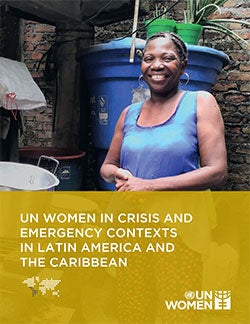
UN Women in Crisis and Emergency Contexts in Latin America and the Caribbean

Latin America and the Caribbean is one of the regions of the world with the highest exposure to disasters, with the Caribbean facing increased risks given its geography. This combines with the region’s high vulnerability to climate change. The high rates of violence in the region are equally alarming, with women and girls being the most frequent victims. Humanitarian crises, regardless of the cause, affect women, men, girls and boys differently. Women and girls are the most vulnerable to suffering the negative effects of humanitarian crises. For this reason, one essential requirement for effective humanitarian response is that the specific and differentiated needs of the population be considered, including women’s and girls’. Women and girls are also agents of change and can play a critical role in community resilience.
In this context, and in the framework of the Sustainable Development Goals (SDGs), UN Women promotes the effective positioning of women and girls as subjects of rights, ensuring equality between men and women as partners and beneficiaries of humanitarian action. This includes: providing specialized knowledge on inclusion of gender equality in humanitarian coordination mechanisms; ensuring that women and girls have access to information, skills and resources to secure livelihoods opportunities in humanitarian contexts; and gathering and using data disaggregated by sex. In these response and recovery efforts, women’s organizations play an essential leadership role. Thanks to these efforts, more women play a central role, and are more fully served, in the humanitarian response. To strengthen these actions, we must extract the good practices and the lessons learned from different emergency situations in the region in order, on the basis of experience, to bolster the procedures for organizational response to emergency situations.
These are but a few examples of how, through part- nerships, UN Women bolsters the performance of its work and plays a decisive role in implementing humanitarian response with a gender perspective. With the future crises, epidemics and disasters linked to climate change in our region, we must broaden the use of data disaggregated by sex in post-crisis needs assessments. It is also essential to empower women and girls as change agents, placing them at the centre of any response, given that they are key actors both for strengthening resilience to risk disaster as well as fordevising and monitoring public policy and regulatory frameworks. These efforts are essential for progress- ing toward the achievement of the SDGs and toward a 50-50 planet by 2030.
Luiza CarvalhoRegional
DirectorUN WomenAmericas and the Caribbean